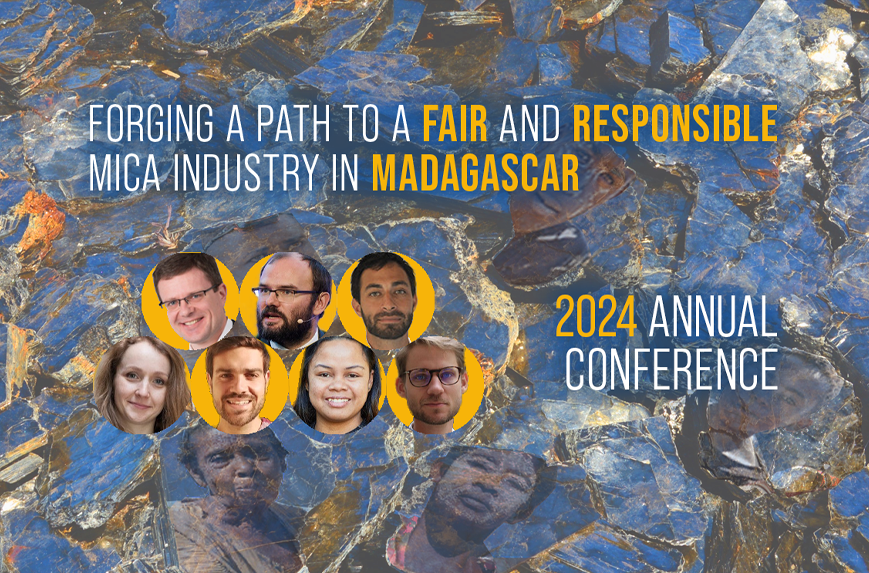
RMI’s Annual Conference, hosted on March 28th, 2024 marked a pivotal moment in the journey towards fostering a sustainable and ethical mica supply chain, with a special focus on Madagascar. Under the esteemed guidance of Louis Maréchal, Senior Advisor for Minerals and Extractives at the OECD, the conference witnessed a convergence of industry leaders, experts, and stakeholders dedicated to addressing the complex challenges inherent in the mica sector.
Diverse expertise, unified vision
The conference commenced with an insightful introduction by Karsten Müller, RMI’s President, setting the stage for a series of thought-provoking discussions, disclosing the public release of RMI 2024 annual report.
Louis Maréchal, Senior Advisor for Minerals and Extractives at the OECD, assumed the role of keynote speaker and facilitator, steering the discussions toward critical topics such as supply chain due diligence and the inherent risks associated with mica sourcing. In his opening remarks, Louis Maréchal insisted on the importance of supply chain due diligence in all geographies and mineral resources, including those, such as the mica, that are not media-prone but play a crucial role in the energy transition. He also highlighted the importance of having management systems in place to adapt to evolving situations and new minerals.
Insights from the field
Nicolas Eslava, Founder of Afaï Consulting, provided invaluable insights into the intricacies of the mica sector in Madagascar. His presentation underscored the importance of stakeholder mapping, which revealed the complexities of the local value chain articulated around miners, collectors, deposits, and exporters. He highlighted how these actors interact with a galaxy of players from the public and private sectors. Nicolas Eslava also stressed the significance of acknowledging the unique links within the sector and the lack of capacity of state agencies responsible for implementation, posing one of the key challenges in the Red Island. Nicolas Eslava emphasized the importance of avoiding duplication of efforts and data loss in the sector, particularly as Madagascar legal framework undergoes a slow transformation of its local legal framework and grapples with a lack of unity in the value chain.
Meanwhile, Alice Gissinger, Research Analyst at BASIC unveiled a comprehensive study examining the potential impact of implementing a living income for upstream mica workers, demonstrating the feasibility of such an initiative and its minimal cost implications in finished goods containing mica. Olivier Dubourdieu, Program Director at the Responsible Mica Initiative (RMI) delved into the socioeconomic dynamics underlying mica pricing at the local level, shedding light on the pressing need to ensure fair wages for mica workers but also strengthening their bargaining power.
Supporting Malagasy artisanal miners: innovations and next steps
Juan Perez, Project Manager at the Alliance for Responsible Mining, presented the Mica branch to the CRAFT Code, or Mica CRAFT — a pioneering tool designed to empower artisanal miners to meet market expectations and to adapt essential due diligence requirements to the reality of the mica collectors and pickers. Through open-source CRAFT code and collaborative efforts, this new branch of the code aims to promote transparency and provide the RMI with a progressive standard for better practices in the mica collecting and mining sites
Karine Danielson, Senior Consultant at BuyYourWay shared her recommendations after performing a comparative analysis to assess the alignment between the RMI standards and Madagascar’s local legal framework. Karine encouraged RMI and its members not to wait for complete alignment between its standards and the local framework, as the implementation of RMI’s standards will help the development of more responsible practices. However, a discussion with local stakeholders and authorities will be needed to introduce these new standards to the stakeholders and propose a realistic implementation plan, as it is crucial for all stakeholders to understand the implications of these changes.
The conference concluded with a forward-looking agenda, outlining key initiatives conducted by the RMI aiming to drive tangible change within the mica supply chain by:
Towards a Better Future
As RMI’s President Karsten Mueller reiterated in his closing remarks, the journey towards a sustainable mica supply chain requires collective commitment and collaboration. With each stakeholder playing a vital role in the process, the conference served as a catalyst for transformative action, laying the groundwork for a future where responsible practices and social responsibility could define the mica sector landscape in Madagascar and beyond.
Unveiling Progress: The RMI Annual Report
The conference also marked the official announcement of RMI’s 2023 Annual Report. Providing a comprehensive overview of the organization’s activities and achievements, the report serves as a testament to the collective efforts aimed at fostering transparency, accountability, and sustainability within the mica sector.
You want to learn more?
We encourage you to watch the recording of the Annual Conference to hear the full session.